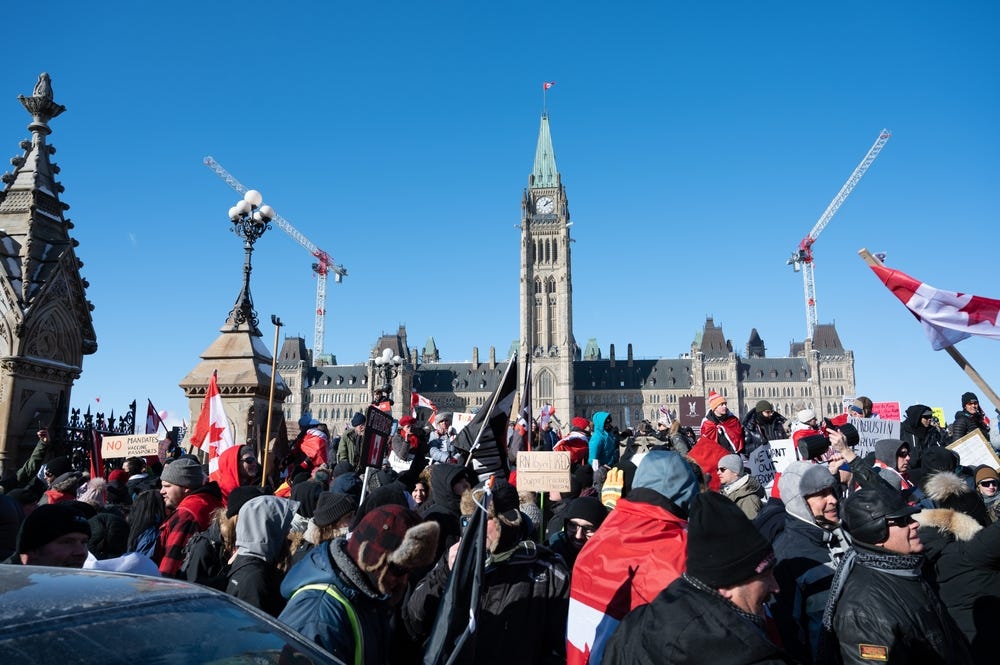Josh Dehaas: More Liberal overreach
The feds are arguing for the right to block any protest that might get too rowdy.
By: Josh Dehaas
Earlier this year, Justice Mosley of the Federal Court of Canada ruled that the invocation of the Emergencies Act in response to the Freedom Convoy protests was illegal.
There was a lot to like in that ruling, not least of which because it agreed with the official position of my organization, the Canadian Constitution Foundation.
First, Mosley agreed that the definitions of “national emergency” and “threats to the security of Canada” weren’t met by the federal government, thus invalidating their use of the Emergencies Act. Second, the Justice agreed that freezing bank accounts without a warrant violated the Charter right against unreasonable searches. Third, he agreed that the regulations that banned travelling to, participating in, and funding certain assemblies under threat of up to five years in prison violated freedom of expression.
But not all of Mosley's ruling was commendable, from our point of view. What we didn’t like was a finding that the same regulations that violated expression because they banned a person from “merely going onto Parliament Hill waving a placard” regardless of whether that person had blockaded or breached the peace, didn’t also violate the Charter guarantee of freedom of peaceful assembly. How could that be? The CCF is asking the Federal Court of Appeal to overturn that finding when it hears the government’s appeal, most likely in early 2025.
This week, we got the government’s stunning and frankly, disturbing, response to that very point of contention. We expected the government to argue that the limitations to individuals’ rights to peaceful assembly were reasonable, given the need to deal with the protest writ large. That wasn't their only claim.
Instead, the government pulled out an entirely novel line of reasoning, arguing that the Charter doesn’t protect assemblies if they might turn violent or breach the peace. If the Federal Court of Appeal greenlights that standard for freedom of peaceful assembly — establishing a new precedent on when Charter freedoms can be subject to limits — then governments would have the power to ban virtually every large protest. The federal government’s view that assemblies are not Charter-protected and can be blocked in advance if someone in the crowd might reasonably be expected to breach the peace cannot stand if we’re to have any meaningful right to peaceful assembly at all.
Take the recent anti-Israel marches. These protests have annoyed, and at times sickened, Canadians because some among the crowds have celebrated the Oct. 7 terror attack as justified “resistance.” These protests have been mostly non-violent, but have led to breaches of the peace, including scuffles on the sidelines. If these proposed legal standard prevail, this or some future government could pass a law to ban these protests today. Before you say “sign me up!” (part of me would very much like to see that, too), think about how shortsighted that would be. If today’s government can ban protests that you don’t like today, a future government can ban protests you do like. Under the Trudeau government’s proposed standard, an anti-racism protest in a public park could be shut down if police have reason to believe that neo-Nazis might show up to cause trouble. Under that standard, police could ban Pride marches, since the Toronto Pride parade has been blockaded by anti-Israel protesters and Black Lives Matter members in the past and might be blockaded again.
Thankfully, there are a bunch of things we can do to deal with the truly troublesome aspects of protests without handing governments the power to kibosh any large protest. For example, let’s start by enforcing noise bylaws. You have a right to yell and chant, but you don’t have a right to drive around with sound amplifiers in the back of pickup trucks taunting condo-dwellers with genocidal nursery rhymes. We can also enforce laws like Ontario's Highway Traffic Act. You have a right to honk your horn and adorn your truck with a “Fuck Trudeau” sticker, but you don’t have a right to block traffic. We can also use section 34(1) of the Immigration and Refugee Protection Act to deport non-citizens who are genuinely members of terrorist groups. Police can also start seriously and evenly enforcing the Criminal Code provisions against mischief, intimidation, rioting, and masking while rioting.
We should not, however, accept the Trudeau government’s claim that the Charter doesn’t protect assemblies where someone in the crowd might reasonably be expected to breach the peace. If we support that, we would sooner or later regret it. You never know when you’ll need your right to peaceful assembly to push back against an authoritarian government.
Josh Dehaas is counsel with the Canadian Constitution Foundation.
The Line is entirely reader and advertiser funded — no federal subsidy for us! If you value our work, have already subscribed, and still worry about what will happen when the conventional media finishes collapsing, please make a donation today.
The Line is Canada’s last, best hope for irreverent commentary. We reject bullshit. We love lively writing. Please consider supporting us by subscribing. Follow us on Twitter @the_lineca. Fight with us on Facebook. Pitch us something: lineeditor@protonmail.com



"Police can also start seriously and evenly enforcing the Criminal Code provisions against mischief, intimidation, rioting, and masking while rioting." Yes please. Enforce the laws that are already in place as a start.
Four simple proposals to manage protests:
1. No masks allowed.
2. All protests to take place within the confines of designated protest sites.
3. No blockage of any traffic lanes or sidewalks allowed.
4. All police costs to provide security to be borne by organizers.